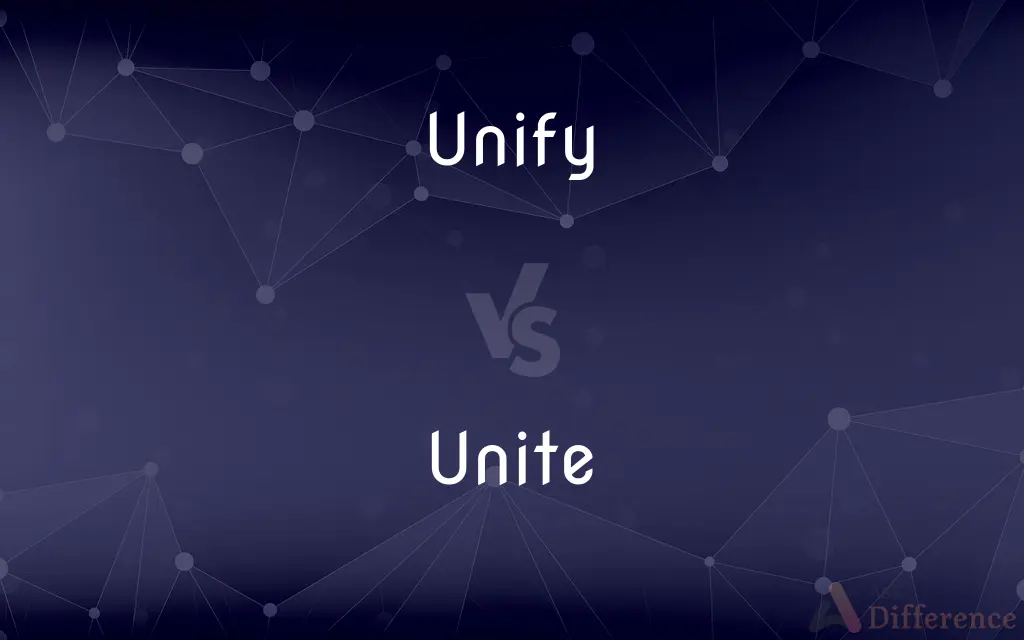Unify vs. Unite — What's the Difference?
By Fiza Rafique & Urooj Arif — Updated on March 6, 2024
Unify emphasizes bringing parts together into a whole, while unite focuses on joining people or groups for a common purpose.

Difference Between Unify and Unite
Table of Contents
ADVERTISEMENT
Key Differences
Unify is typically used when discussing the process of making disparate elements come together to form a cohesive whole. This term often finds its place in conversations about merging ideas, systems, or structures. On the other hand, unite is more commonly associated with bringing people or groups together, especially for a shared cause or belief. It carries a connotation of solidarity and collective action.
Unify suggests a process that may involve integrating different components, such as merging technologies or philosophies, to create a single entity or system. This term implies a harmonization of elements that might originally have been distinct or disparate. Whereas unite implies action taken by individuals or groups to come together, often voluntarily, to achieve common goals or stand against a common challenge. It emphasizes the act of joining forces or standing in solidarity.
The concept of unification often involves a technical or systematic process, focusing on the structural aspects of bringing things together. It is about creating a seamless integration where previously there were divisions. Unite, however, emphasizes the emotional or relational aspects of coming together, focusing on the bond or alliance formed between parties. It highlights the interpersonal dynamics and mutual support within a collective.
Unify can also suggest a formal or official merging, as seen in political or organizational contexts, where entities are brought under a single governance or framework. It underscores the strategic and often administrative efforts to create unity. On the other hand, unite can have a more grassroots or organic connotation, emphasizing voluntary association and shared commitment among members of a community or movement.
Unify and unite can be used interchangeably, especially when the focus is broadly on the concept of coming together. However, the nuances of each term can provide clarity about the nature of the connection being formed—whether it is among ideas, systems, or people.
ADVERTISEMENT
Comparison Chart
Focus
Integration of parts into a whole
Joining people/groups for a cause
Connotation
Harmonization, systematic merging
Solidarity, collective action
Common Usage
Technologies, ideas, systems
People, groups, movements
Implication
Structural, technical integration
Emotional, relational bonding
Example Context
Political or organizational merger
Grassroots movements, community alliances
Compare with Definitions
Unify
To make or become a single unit; to merge.
The new software aims to unify various data management systems.
Unite
To connect or associate for mutual benefit.
The merger will unite the two leading tech companies.
Unify
To harmonize or make coherent.
The artist seeks to unify disparate styles into a cohesive whole.
Unite
To bond or come together as one.
In times of crisis, people often unite to help each other out.
Unify
To eliminate divisions or differences.
The peace talks aim to unify the warring factions.
Unite
To come or bring together in agreement or alliance.
Different political parties unite for electoral reform.
Unify
To bring together for a common purpose or action.
The company's goal is to unify its global teams through shared objectives.
Unite
To join together for a common purpose or action.
The community will unite to support the local charity event.
Unify
To consolidate or combine.
The two organizations decided to unify their resources for greater impact.
Unite
To form a unity or agreement among members.
The team united in their effort to win the championship.
Unify
To make into or become a unit; consolidate.
Unite
To bring together so as to form a whole
The different structures are united in a single flower.
Unify
(transitive) Cause to become one; make into a unit; consolidate; merge; combine.
Unite
To combine (people) in interest, attitude, or action
United the rival factions of the party.
Unify
(intransitive) Become one.
Unite
To join (a couple) in marriage.
Unify
To cause to be one; to make into a unit; to unite; to view as one.
A comprehensive or unifying act of the judging faculty.
Perception is thus a unifying act.
Unite
To have or demonstrate in combination
The course unites current theory and practice.
Unify
Become one;
Germany unified officially in 1990
Will the two Koreas unify?
Unite
To become joined, formed, or combined into a unit
When reproductive cells unite.
Unify
To bring or combine together or with something else;
Resourcefully he mingled music and dance
Unite
To join and act together in a common purpose or endeavor.
Unify
Act in concert or unite in a common purpose or belief
Unite
(transitive) To bring together as one.
The new government will try to unite the various factions.
I hope this song can unite people from all different cultures.
Unify
Join or combine;
We merged our resources
Unite
(reciprocal) To come together as one.
If we want to win, we will need to unite.
Unite
A British gold coin worth 20 shillings, first produced during the reign of King James I, and bearing a legend indicating the king's intention of uniting the kingdoms of England and Scotland.
Unite
To put together so as to make one; to join, as two or more constituents, to form a whole; to combine; to connect; to join; to cause to adhere; as, to unite bricks by mortar; to unite iron bars by welding; to unite two armies.
Unite
Hence, to join by a legal or moral bond, as families by marriage, nations by treaty, men by opinions; to join in interest, affection, fellowship, or the like; to cause to agree; to harmonize; to associate; to attach.
Under his great vicegerent reign abide,United as one individual soul.
The king proposed nothing more than to unite his kingdom in one form of worship.
Unite
To become one; to be cemented or consolidated; to combine, as by adhesion or mixture; to coalesce; to grow together.
Unite
To join in an act; to concur; to act in concert; as, all parties united in signing the petition.
Unite
United; joint; as, unite consent.
Unite
Act in concert or unite in a common purpose or belief
Unite
Become one;
Germany unified officially in 1990
Will the two Koreas unify?
Unite
Have or possess in combination;
She unites charm with a good business sense
Unite
Be or become joined or united or linked;
The two streets connect to become a highway
Our paths joined
The travelers linked up again at the airport
Unite
Join or combine;
We merged our resources
Common Curiosities
Can you unite ideas?
Yes, ideas can be united when they are brought together to form a comprehensive or coherent whole.
Is unify more about structure than unite?
Yes, unify often implies structural or systematic integration, whereas unite focuses more on emotional or relational bonding.
What does it mean to unify a group?
To unify a group means to bring its members or elements together in a way that they operate or are regarded as a single unit.
Is the outcome of unifying always positive?
The intent is positive, focusing on cohesion and efficiency, but outcomes can vary depending on execution and context.
Can unite have negative connotations?
Rarely, but it might if the purpose or cause of uniting is viewed negatively by others.
Does unite always imply action by people?
Primarily, yes. Unite usually involves actions or decisions made by people to come together for common purposes.
Can organizations be unified or just united?
Organizations can be both unified and united; unified in terms of structural integration and united in terms of shared goals or visions.
How does culture affect the process of unifying or uniting?
Cultural values and practices can significantly influence how and why individuals or groups choose to unify or unite.
How do unify and unite relate to teamwork?
Teamwork involves both unifying (integrating diverse skills and roles) and uniting (fostering a shared goal or spirit) efforts.
Is it easier to unify objects or unite people?
Context-dependent, but generally, unifying objects may be more straightforward due to less complexity compared to uniting people with diverse views.
Can a leader unify and unite simultaneously?
Yes, a leader can work on structural integration (unify) while also fostering a sense of solidarity and common purpose (unite).
What is the difference between unify and unite in political contexts?
In political contexts, unify may refer to the consolidation of territories or systems, while unite often refers to forming alliances or coalitions among different groups.
Can unify be used in a personal context?
Yes, it can refer to harmonizing aspects within oneself or one's personal environment.
What is the role of communication in unifying and uniting?
Communication is crucial in both processes, for clarifying visions in unifying efforts and for building relationships and consensus in uniting activities.
Can technology unify or unite people?
Technology can do both: unify people by creating integrated platforms and unite them by facilitating communication for common causes.
Share Your Discovery

Previous Comparison
Attorney vs. Solicitor
Next Comparison
Amuse vs. EntertainAuthor Spotlight
Written by
Fiza RafiqueFiza Rafique is a skilled content writer at AskDifference.com, where she meticulously refines and enhances written pieces. Drawing from her vast editorial expertise, Fiza ensures clarity, accuracy, and precision in every article. Passionate about language, she continually seeks to elevate the quality of content for readers worldwide.
Co-written by
Urooj ArifUrooj is a skilled content writer at Ask Difference, known for her exceptional ability to simplify complex topics into engaging and informative content. With a passion for research and a flair for clear, concise writing, she consistently delivers articles that resonate with our diverse audience.














































